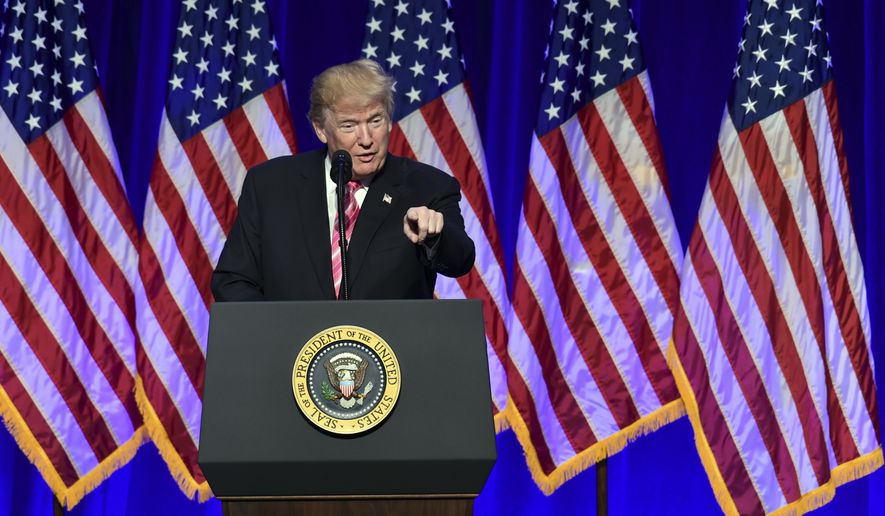With some black leaders boycotting the event, President Trump paid tribute Saturday to the heroes of the civil rights movement at the dedication of two museums in Mississippi.
Speaking to a small invitation-only group of dignitaries indoors at the new civil-rights museum in Jackson, Mr. Trump called the facility honoring leaders of the movement “a tribute to our nation at the highest level.”
“Today we pay solemn tribute to our heroes of the past and dedicate ourselves to building a future of freedom, equality, justice and peace,” Mr. Trump said.
The president, who was invited by Republican Mississippi Gov. Phil Bryant, didn’t take part in a public ceremony outdoors. The long list of speakers at the larger event was missing Democratic Rep. John Lewis of Georgia, a civil-rights icon who skipped the ceremony in protest of the president’s visit, calling it a “mockery” of black leaders’ efforts.
Mr. Lewis and Rep. Bennie Thompson, Mississippi Democrat, said the president’s “hurtful policies are an insult to the people portrayed in this civil rights museum” and that his “disparaging comments about women, the disabled, immigrants and National Football League players disrespect the efforts” of people who fought for civil rights.
NAACP President Derrick Johnson called Mr. Trump’s appearance “a distraction,” and other black leaders also stayed away from the grand opening in protest. Demonstrators near the museum site held up signs during the president’s visit that said “Make America Civil Again” and “Lock Him Up,” while others chanted “No Trump, no hate, no KKK in the USA.”
Jackson Mayor Chokwe Lumumba also boycotted the event, instead participating in a counter-rally at a cultural center about a mile away from the new museums.
“We are standing in accord with the ideals of what this civil rights movement means, and that is why we choose not to share a stage with Donald Trump,” Mr. Lumumba said. “Mr. President, we don’t need you to tell us in Mississippi what the civil rights movement was about.”
The president didn’t directly address the boycott. But he praised and applauded Myrlie Evers-Williams, widow of slain civil-rights figure Medgar Evers, and met with Mr. Evers’ brother, Charles. Mr. Trump called Medgar Evers, who was assassinated by a Ku Klux Klan member in 1963, “a great American hero.”
“He knew it was long past time for his nation to fulfill its founding promise, to treat every citizen as an equal child of God,” Mr. Trump said. “That is what others in this museum were — true American heroes. Today we strive to be worthy of their sacrifice. We pray for inspiration from their examples.”
The president spoke of “the fight to end slavery, to break down Jim Crow, to end segregation, to gain the right to vote, and to achieve the sacred birthright of equality.”
“Here we memorialize the brave men and women who struggled to sacrifice, and sacrifice so much, so that others might live in freedom,” he said, calling the Rev. Martin Luther King Jr. “a man who I studied and watched admired for my entire life.”
Reuben Anderson, the state’s first black Supreme Court justice, led a private tour for Mr. Trump and Housing and Urban Development Secretary Ben Carson.
“We’ve been through a whole lot, we’ve seen a whole lot, but we’re a forgiving and loving state,” Judge Anderson said. “They took lives, they took a whole lot of things.”
He called the $91 million museums a “kind of a thank you” to those who made the sacrifices to secure equality.
The facility houses two museums under one roof — a civil-rights museum focusing on the period from 1945 to 1976, and a state history museum covering 15,000 years of human habitation in the region.
• Dave Boyer can be reached at dboyer@washingtontimes.com.




Please read our comment policy before commenting.